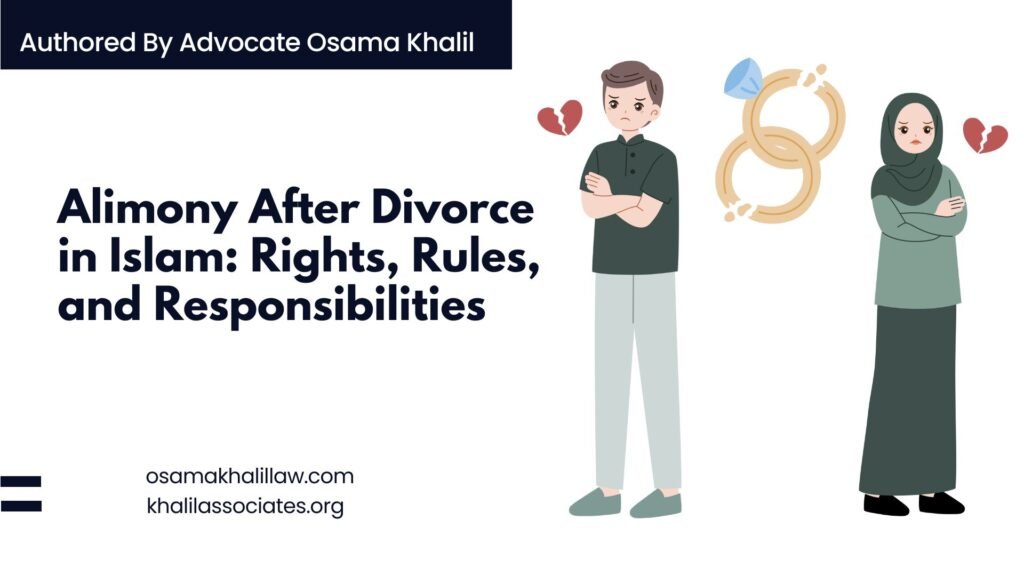
Islamic law ensures fairness in financial matters after divorce. When a marriage ends, the husband must provide Islamic alimony to his ex-wife under specific conditions. This financial support, known as nafaqah, covers basic needs like food, clothing, and shelter.
Many people wonder about maintenance after divorce in Islam. The rules are clear and protect women’s rights. This article explains everything in simple terms so anyone can understand spousal support (Islamic alimony after divorce) in Islam without confusion.
What Is Alimony in Islam?
Islamic alimony refers to the financial support a husband must give his wife after divorce. Unlike secular laws, Islam sets specific guidelines for nafaqah in divorce. The purpose is to ensure the wife does not suffer financially because of separation.
The Quran and Hadith mention financial rights after divorce in detail. These rules apply until the wife remarries or the waiting period (iddah) ends. In some cases, maintenance after divorce may extend beyond the iddah period if the wife cannot support herself.
Types of Financial Support After Divorce in Islam
Islam recognizes different forms of Islamic alimony. Each type serves a specific purpose and has its own conditions.
1. Maintenance During Iddah (Waiting Period)
After divorce, a woman must observe iddah—a waiting period before she can remarry. During this time, the husband must provide spousal support in Islam. He must cover her housing, food, and clothing.
The Quran says:
“Let the women live in the same style as you live, according to your means.” (Surah At-Talaq, 65:6)
This verse confirms that nafaqah in divorce is mandatory.
2. Child Support in Islam
If the couple has children, the father must provide for them. Financial rights after divorce include child maintenance until they reach adulthood. The mother usually gets custody, but the father bears financial responsibility.
3. Mut’ah (Consolation Gift)
Some divorces require mut’ah, a one-time payment to the wife. This gift eases her transition to single life. The Quran mentions:
“And give the women their dowries as a free gift.” (Surah An-Nisa, 4:4)
This is not the same as Islamic alimony, but it is part of maintenance after divorce.
Conditions for Receiving Alimony in Islam
Not every divorced woman automatically gets spousal support in Islam. Certain conditions apply:
1. The Wife Must Be in Iddah
Islamic alimony is obligatory only during iddah. If the wife remarries immediately, the husband’s responsibility ends.
2. The Wife Must Not Have Initiated Khula
If the wife seeks khula (divorce by returning the dowry), she may lose financial rights after divorce. However, scholars differ on this ruling.
3. The Husband Must Have Financial Ability
A husband must pay nafaqah in divorce only if he can afford it. If he is poor, the court may reduce or waive the amount.
How Long Does Islamic Alimony Last?
Maintenance after divorce does not last forever. The duration depends on circumstances:
- For Revocable Divorce (First or Second Talaq): The husband must support the wife during iddah (3 menstrual cycles).
- For Irrevocable Divorce (Third Talaq): The husband must still provide Islamic alimony during iddah, but not after.
- If the Wife Is Pregnant: Spousal support in Islam continues until childbirth.
After iddah, the wife loses financial rights after divorce unless she has a valid reason, like disability.
What If the Husband Refuses to Pay Alimony?
Islam has strict rules against neglecting nafaqah in divorce. If a husband refuses to pay Islamic alimony, the wife can seek help:
- Family Mediation: Elders or scholars can intervene.
- Islamic Court: A judge can force the husband to pay maintenance after divorce.
- Legal Action: Many Muslim countries enforce spousal support in Islam through civil laws.
The Quran warns:
“And if they are pregnant, spend on them until they deliver.” (Surah At-Talaq, 65:6)
This shows the importance of financial rights after divorce.
Difference Between Islamic Alimony and Western Alimony
Islamic alimony differs from Western laws in key ways:
- Fixed Duration: Nafaqah in divorce lasts only during iddah (unless extended).
- No Lifetime Support: Unlike some Western laws, Islam does not enforce lifelong maintenance after divorce.
- Husband’s Responsibility Only: In Islam, only the husband pays spousal support in Islam.
Common Misconceptions About Alimony in Islam
Many people misunderstand financial rights after divorce. Let’s clarify:
1. “Alimony Is Only for Rich Husbands”
False. Even a poor husband must provide basic Islamic alimony within his means.
2. “Women Always Get Alimony Forever”
No. Maintenance after divorce stops after iddah unless specified otherwise.
3. “A Working Wife Gets No Alimony”
Not true. Even if the wife earns, the husband must still pay nafaqah in divorce during iddah.
Conclusion: Key Takeaways on Islamic Alimony
Islam ensures fairness in financial rights after divorce. The husband must provide Islamic alimony during the waiting period. Spousal support in Islam protects women from sudden financial hardship.
If you face issues with maintenance after divorce, consult a scholar or legal expert. Understanding nafaqah in divorce helps both spouses fulfill their Islamic duties.
By following these rules, Muslims can ensure justice and compassion in divorce matters.
Legal Assistance
For professional legal guidance and support in immigration matters, you may contact:
Mr. Osama Khalil
Lawyer & Legal Consultant
📞 Phone: 0316-1829946
📧 Email: contact@osamakhalillaw.com | contact@khalilassociates.org
